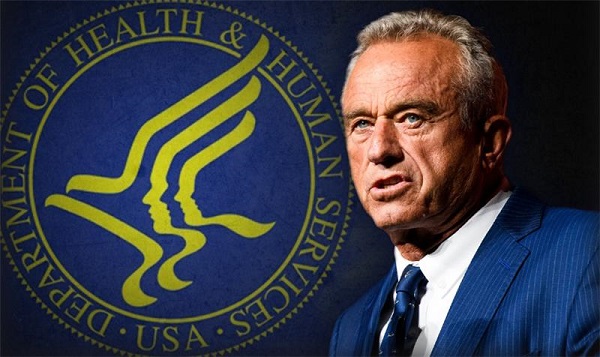Health
Senate confirms RFK Jr. as Trump’s secretary of Health and Human Services

From LifeSiteNews
Kennedy’s sharp criticism of the HHS has opened an unprecedented opportunity for reform.
The U.S. Senate voted 52-48 on Thursday to confirm Robert F. Kennedy Jr. as America’s next secretary of the Department of Health & Human Services (HHS), cementing an unconventional partnership between Republican President Donald Trump and an ex-Democrat and longtime critic of the medical establishment.
Kennedy, nephew of the late President John F. Kennedy and son of the late Attorney General Robert Kennedy, is a longtime environmental and medical activist, who initially attempted to challenge President Joe Biden for the Democrat nomination, switched to an independent bid against both Biden and Trump after months of accusing party leadership of having “rigged” the primary process against him, and ultimately dropped out and endorsed Trump in August 2024.
Senators voted 53-47 to invoke cloture on Wednesday, limiting debate over the nomination to a final 30-hour window before a simple-majority confirmation vote. As of press time, Kennedy secured at least 50 votes, meaning that even if the remaining 50 vote against him, Vice President J.D. Vance will be able to break the tie. Former Senate Majority Leader Mitch McConnell was the only Republican to vote no.
Instrumental to Republican support was Kennedy’s assurance that he would implement pro-life policies at HHS despite his ardently pro-abortion history, and convincing senators like Bill Cassidy (R-LA) that he was less opposed to conventional vaccines than his history suggests. Sen. Susan Collins (R-ME), another expected holdout, announced the day before she would support him.
Kennedy now rises to the top of the very national health bureaucracy he has so sharply criticized for so long, opening an unprecedented opportunity for reform. Whether it will be taken, however, remains to be seen.
As one of the country’s most vocal critics of the COVID establishment and vaccines more generally, Kennedy joining forces with Trump was crucial to reassuring voters that the second Trump administration would take a critical reassessment of the COVID shots that the returning president has previously embraced, although most of Kennedy’s comments since joining Trump have focused on other issues, such as conventional vaccines and harmful food additives.
During the confirmation hearings, Kennedy called the first Trump administration’s Operation Warp Speed initiative, which birthed the COVID vaccines in record time, “an extraordinary accomplishment and demonstration of leadership by President Trump.” Trump himself has also recently met with Microsoft chief Bill Gates and artificial intelligence executives about potential future OWS-like initiatives for mRNA-based vaccines targeting cancer and HIV.
Health
FDA warns ‘breast binder’ manufacturers to stop marketing to gender-confused girls

From LifeSiteNews
Dr. Marty Makary took aim at the transgender-medical-industrial complex that has exploded in recent years during a recent press conference.
Food and Drug Administration (FDA) commissioner Dr. Marty Makary has sternly warned companies manufacturing “breast binders” to cease marketing and supplying their product to gender-confused girls seeking to make their bodies appear masculine.
“Today the FDA is taking action,” said Makary in a press conference. “We are sending warning letters to 12 manufacturers and retailers for illegal marketing of breast binders for children, for the purposes of treating gender dysphoria.”
“Breast binders are a class one medical device with legitimate medical users, such as being used by women after breast cancer surgery,” but “these binders are not benign,” he cautioned. “Long-term usage has been associated with pain, compromised lung function, and even difficulty breast feeding later in life.”
“The warning letters will formally notify the companies of their significant regulatory violations and require prompt corrective action,” said the FDA head.
.@DrMakaryFDA: “Today the FDA is taking action. We are sending warning letters to 12 manufacturers and retailers for illegal marketing of breast binders for children, for the purposes of treating gender dysphoria.” pic.twitter.com/6JNAy36223
— HHS Rapid Response (@HHSResponse) December 18, 2025
The warning letter addressed to California manufacturer, GenderBender, notes that the company’s website states that “[c]hest binding is the practice of compressing breast mass into a more masculine shape, often done in the LGBTQ community for gender euphoria.”
“Your firm should take prompt action to address any violations identified in this letter. Failure to adequately address this matter may result in regulatory action being initiated by the FDA without further notice. These actions include, but are not limited to, seizure and injunction,” advised the FDA.
During his presentation, Makary took aim at the transgender-medical-industrial complex that has exploded in recent years.
“One of the most barbaric features of a society is the genital mutilation of its children,” observed Makary.
“Pushing transgender ideology in children is predatory, it’s wrong, and it needs to stop,” he declared.
“This ideology is a belief system that some teachers, some pediatricians, and others are selling to children without their parents knowing sometimes, or with a deliberate attempt to remove parents from the decision making,” Makary explained.
To witness society “putting kids on a path of chest binders, drugs, castration, mastectomies, and other procedures is a path that now many kids regret,” he lamented, as he pointed to Chloe Cole, who has reverted to her God-given femininity after undergoing so-called “gender-affirming” surgery as a teen.
Cole is a leading voice for young people who have “detransitioned” after having medically, surgically, and socially attempted to “transition” to a member of the opposite sex.
.@DrMakaryFDA: “Pushing transgender ideology in children is predatory, it's wrong, and it needs to stop.” pic.twitter.com/TXxWNEtNZk
— HHS Rapid Response (@HHSResponse) December 18, 2025
Health
All 12 Vaccinated vs. Unvaccinated Studies Found the Same Thing: Unvaccinated Children Are Far Healthier

I joined Del Bigtree in studio on The HighWire to discuss what the data now make unavoidable: the CDC’s 81-dose hyper-vaccination schedule is driving the modern epidemics of chronic disease and autism.
This was not a philosophical debate or a clash of opinions. We walked through irrefutable, peer-reviewed evidence showing that whenever vaccinated and unvaccinated children are compared directly, the unvaccinated group is far healthier—every single time.
Reanalyzing the Largest Vaccinated vs. Unvaccinated Birth-Cohort Study Ever Conducted
At the center of our discussion was our peer-reviewed reanalysis of the Henry Ford Health System vaccinated vs. unvaccinated birth-cohort study (Lamerato et al.)—the largest and most rigorous comparison of its kind ever conducted.
|
The original authors relied heavily on Cox proportional hazards models, a time-adjusted approach that can soften absolute disease burden. Even so, nearly all chronic disease outcomes were higher in vaccinated children.
Our reanalysis used direct proportional comparisons, stripping away the smoothing and revealing the full magnitude of the signal.
- All 22 chronic disease categories favored the unvaccinated cohort when proportional disease burden was examined
- Cancer incidence was 54% higher in vaccinated children (0.0102 vs. 0.0066)
- When autism-associated conditions were grouped appropriately—including autism, ADHD, developmental delay, learning disability, speech disorder, neurologic impairment, seizures, and related diagnoses—the vaccinated cohort showed a 549% higher odds of autism-spectrum–associated clinical outcomes
The findings are internally consistent, biologically coherent, and concordant with every prior vaccinated vs. unvaccinated study, all of which show drastically poorer health outcomes among vaccinated children
The 12 Vaccinated vs. Unvaccinated Studies Regulators Ignore
In the McCullough Foundation Autism Report, we compiled all 12 vaccinated vs. unvaccinated pediatric studies currently available. These studies span different populations, countries, study designs, and data sources.
Every single one reports the same overall pattern. Across all 12 studies, unvaccinated children consistently exhibit substantially lower rates of chronic disease, including:
- Autism and other neurodevelopmental disorders
- ADHD, tics, learning and speech disorders
- Asthma, allergies, eczema, and autoimmune conditions
- Chronic ear infections, skin disorders, and gastrointestinal illness
This level of consistency across independent datasets is precisely what epidemiology looks for when assessing causality. It also explains why no federal agency has ever conducted—or endorsed—a fully vaccinated vs. fully unvaccinated safety study.
Flu Shot Failure
We also addressed the persistent failure of seasonal influenza vaccination.
A large Cleveland Clinic cohort study of 53,402 employees followed participants during the 2024–2025 respiratory viral season and found:
- 82.1% of employees were vaccinated against influenza
- Vaccinated individuals had a 27% higher adjusted risk of influenza compared with the unvaccinated state (HR 1.27; 95% CI 1.07–1.51; p = 0.007)
- This corresponded to a negative vaccine effectiveness of −26.9% (95% CI −55.0 to −6.6%), meaning vaccination was associated with increased—not reduced—risk of influenza
When vaccination exposure increases, chronic disease, neurodevelopmental disorders, and inflammatory illness increase with it. When children are unvaccinated, they are measurably healthier across virtually every outcome that matters.
The science needed to confront the chronic disease and autism epidemics already exists. What remains is the willingness to acknowledge it.
Epidemiologist and Foundation Administrator, McCullough Foundation
Support our mission: mcculloughfnd.org
Please consider following both the McCullough Foundation and my personal account on X (formerly Twitter) for further content.
FOCAL POINTS (Courageous Discourse) is a reader-supported publication.
To receive new posts and support my work, consider becoming a free or paid subscriber.
-

 International2 days ago
International2 days agoOttawa is still dodging the China interference threat
-

 Business1 day ago
Business1 day agoTaxing food is like slapping a surcharge on hunger. It needs to end
-

 Health1 day ago
Health1 day agoFDA warns ‘breast binder’ manufacturers to stop marketing to gender-confused girls
-

 Business18 hours ago
Business18 hours agoThere’s No Bias at CBC News, You Say? Well, OK…
-

 espionage2 days ago
espionage2 days agoCarney Floor Crossing Raises Counterintelligence Questions aimed at China, Former Senior Mountie Argues
-

 Energy2 days ago
Energy2 days ago75 per cent of Canadians support the construction of new pipelines to the East Coast and British Columbia
-

 Agriculture1 day ago
Agriculture1 day agoSupply Management Is Making Your Christmas Dinner More Expensive
-

 International1 day ago
International1 day ago2025: The Year The Narrative Changed














